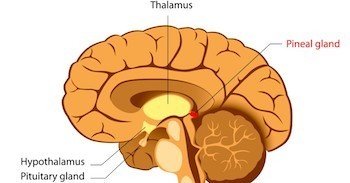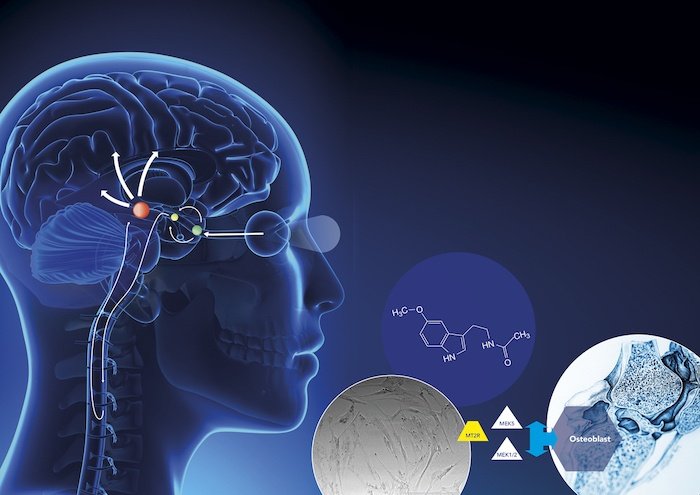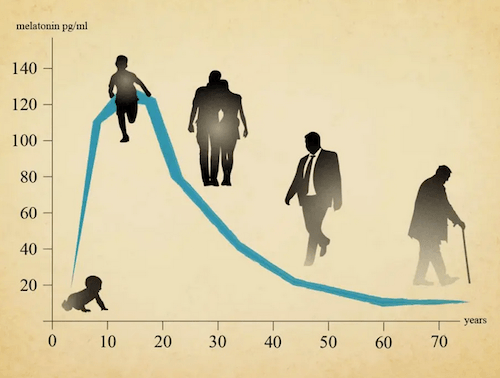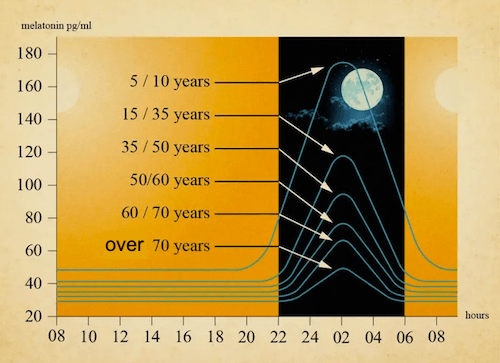How Melatonin Improves Memory (and much more) As We Age

Yes, melatonin improves memory, but it can benefit you in many other ways. If your aim is to optimize your health and extend your healthspan, consider supplementing with melatonin.
I’m going to explain how melatonin improves memory in a bit, but first I want to describe and underscore its overall importance to health.
Melatonin is a hormone primarily released by the pineal gland in your brain at night, so it has long been  associated with control of your natural sleep–wake cycle. As a dietary supplement typically taken by mouth, melatonin is often used for the short-term treatment of insomnia, such as from jet lag or shift work. A good night’s rest is important, but the value of a melatonin supplement routine extends well beyond restful sleep.
associated with control of your natural sleep–wake cycle. As a dietary supplement typically taken by mouth, melatonin is often used for the short-term treatment of insomnia, such as from jet lag or shift work. A good night’s rest is important, but the value of a melatonin supplement routine extends well beyond restful sleep.
For instance, it’s very important that you get a sufficient amount of melatonin to support the many biological functions that it affects, especially as you age, such as:
- Cognitive function
- Resistance to SARS-CoV-2 infection
- Age-related macular degeneration
- Prostrate cancer
- Seasonal depression
- Human growth hormone
- GERD
- Reproductive functions
- Free radicals, and
- Neurological/psychological health.
Unfortunately, our pineal gland produces less and less melatonin as we get older, so since we all age, let’s address this first, then move on to how melatonin improves memory, protects against Covid and the rest.
Melatonin Declines with Age
Everything in our body seems to decline as we age, and our melatonin levels are no exception. Famed melatonin researcher Dr. Walter Pierpaoli asserts that two signs of age-related deterioration in the hormonal control of our essential functions such as sleep, physical strength, adaptation to temperature, sexual vigor, resistance to infections, etc. are:
- The flattening and disappearance of the night-time melatonin peak (the most direct relationship between melatonin and aging); and
- The constant reduction in blood zinc levels while aging.
Although these functions are hormonally controlled, it’s pineal gland impulses that regulate hormonal cycles and rhythms (day and night), and these impulses send and receive messages to and from the endocrine glands.
And, according to Dr. Pierpaoli, adding zinc to melatonin provides the biological base for resynchronizing the hormonal system. This melatonin-zinc combination, he says, starts up a chain of events, that can restore lost hormonal balance to a level of stability.
Dr. Pierpaoli’s studies suggest that maintaining the integrity of the pineal gland with melatonin and zinc allows the former to carry out its function optimally. These two associated molecules have shown that they work for a rapid recovery of all pineal gland functions, while at the same time they restore full psychosomatic balance, he asserts.
Consequently, as we age, we want to keep our peak night-time melatonin out from precipitously falling, as this illustration shows:
If you’re intent on using melatonin to help slow down the aging process, select a melatonin supplement that contains zinc. Dr. Pierpaoli has made such a supplement called Melatonin MZS, which you can buy on (and is recommended by) Amazon.com. It also may help with age-related macular degeneration, as I’ll touch on below.
Melatonin Improves Memory
A common concern as we age is about maintaining good cognitive function. Of course we want a strong and agile body, but what we most identify with is our mind. So, how can melatonin improve memory?
A study conducted at Tokyo Medical and Dental University (TMDU) in Japan and published in October, 2020 shows that melatonin and its metabolites promote the formation of long-term memories in mice and protect against cognitive decline.
Why mice are good lab subjects to study human biology
Mice are used for many experiments because they are easy to keep and have short reproductive cycles. Mice also share 85% of our protein-coding genome, and bear many resemblances to human physiology, including the circulatory, reproductive, digestive, hormonal and nervous systems. This means they can mirror how humans grow, develop disease, and age. While mice are the predominantly used model organism—along with rats, they make up 95% percent of all lab animals—there are many others. More on this here.
The researchers first established a baseline for mice memory among young mice, and then examined how old mice compared. Not so good. They then divided the old mice into two groups: one group was the control that got no melatonin supplementation, and the other group was administered melatonin, as well as two of its metabolites, AMFK and AMK. (Metabolites are the molecules that melatonin is broken down into after entering the body.)
The metabolite AMK was found to be the most important as melatonin failed to improve memory if it was blocked from metabolizing into AMK.
The lead scientist of the study, Atsuhiko Hattori, said:
We have shown that melatonin’s metabolite AMK can facilitate memory formation in all ages of mice. Its effect on older mice is particularly encouraging and we are hopeful that future studies will show similar effects in older people. If this happens, AMK therapy could eventually be used to reduce the severity of Mild Cognitive Impairment and its potential conversion to Alzheimer’s disease.
It’s nice to know about AMK, but other than adding to your general epistemology, I’m unaware how the layman can benefit from knowing that AMK might be able to protect against cognitive decline in humans, given that we don’t have access to it.
What we do have access to is melatonin supplementation, and as you’ll see, that’s worthy of your consideration if your aim is to optimize your healthspan.
Melatonin Protects Lungs From SARS-CoV-2
SARS-CoV-2 is the virus that we’ve all been hiding from as the pandemic it and COVID-19 — the disease it causes — has raged across the world.
My Covid Immunity course shows you how to protect yourself from getting infected by the virus (highlighting this little known, simple protective measure), and to minimize symptoms should you get infected by lowering your baseline level of systemic inflammation.
And now we have another intervention that a recently-published study says prevents infection by COVID-19. That intervention is melatonin — if it gets into the lungs.
Apparently, melatonin in the lungs acts as a barrier defense against SARS-CoV-2 by blocking the expression of genes that encode proteins in cells acting as viral entry points. Melatonin prevents infection of these cells by the virus, and inhibits the immune response so that the virus remains in the respiratory tract for a few days, eventually leaving to find another host.
So, what must top-of-mind right now is, how do you get melatonin into your lungs?
Melatonin Spray Options
The typical form factors of most melatonin supplements are either a sublingual tablet or capsule, but to get melatonin into your lungs, you need a spray, as the above-cited study suggests. Amazon.com offers several melatonin spray options, some with flavors added.
I don’t recommend those with “natural flavor” additives, but rather suggest you try a product like DaVinci Laboratories Liposomal Melatonin Spray, which happens to be a “Amazon’s Choice” product. It’s orange flavored, but rather than using a natural flavor ingredient, the DaVinci product uses orange oil; presumably, a more healthy option.
Perhaps an even better option if your primary motivation for melatonin supplementation is to help guard against SARS-CoV-2 infection is the Core Med Science brand of melatonin spray, shown in the image above. In addition to melatonin, it contains glutathione, the body’s “Master Antioxidant”. An exhaustive review of the literature and observations showed that glutathione deficiency is the most plausible explanation for serious manifestation and death in COVID-19 patients. (For more about glutathione, read Is Liposomal Glutathione the Best Antioxidant for You?)
Other Melatonin Benefits

Here are five health issues that melatonin may help improve:
1. Melatonin protects against age-related macular degeneration, the leading cause of severe visual loss in older folks. A 2005 study concludes that the daily use of 3 mg melatonin seems to protect the retina and to delay macular degeneration.
2. Melatonin blocks the growth of prostate cancer cells. Researchers at the Harvard School of Public Health measured melatonin levels in 928 men and those who produce higher levels of melatonin had a 75% lower risk for developing advanced prostate cancer [1].
3. Melatonin might reduce symptoms of seasonal depression. It’s winter. The Covid pandemic has upended the world. Sad yet? Well, Some research indicates that it could be linked to changes in your circadian rhythm caused by seasonal light changes [2].
Given that melatonin plays a role in regulating circadian rhythm, low doses are often used to decrease symptoms of seasonal depression. According to one study in 68 people, alterations in circadian rhythm were shown to contribute to seasonal depression, but taking melatonin capsules daily was effective at reducing symptoms [3].
4. Melatonin may increase levels of human growth hormone. This hormone is vital to growth and cellular regeneration, given that higher levels of this important hormone have also been linked to increases in both strength and muscle mass [4,5,6]. One small study in eight men found that both low (0.5 mg) and high (5 mg) doses of melatonin were effective at increasing HGH levels [7], and another study in 32 men showed similar results [8].
5. Melatonin may help treat GERD. Gastroesophageal reflux disease (GERD) is a condition caused by the backflow of stomach acid into the esophagus, resulting in symptoms like heartburn, nausea and belching. Melatonin has been shown to block the secretion of stomach acids, and decrease the production of nitric oxide — a compound that relaxes your lower esophageal sphincter, allowing stomach acid to enter your esophagus [9].
One study showed that taking melatonin alone or with omeprazole (a common GERD medication) was effective at relieving heartburn and discomfort [10]. Another study compared the effects of omeprazole and a dietary supplement containing melatonin along with several amino acids, vitamins and plant compounds in 351 people with GERD. After 40 days of treatment, 100% of people taking the melatonin-containing supplement reported a reduction in symptoms compared to only 66% of the group taking omeprazole [11].
Melatonin not only is useful for all the five health issues covered above, but, according to a 2019 study published by the International Journal of Pharmaceutical Sciences and Research might:
- Improve reproductive functions that are inhibited by circadian (sleep cycle) disorders;
- Protect against free radical damage given its potent antioxidant properties; and
- Play a significant role in the neurological and psychological health in humans.
Which foods contain the most melatonin?
REPORTED LEVEL OF MELATONIN IN VARIOUS PLANTS AND IN FOODS
(From MELATONIN – A REVIEW ON THE LESSER KNOWN POTENTIAL NUTRACEUTICAL)
| Plant / food source | Level of melatonin | |
| Alfalfa | 16 ng/g dry seed | |
| Almonds | 39 ng/g dry seed | |
| Anise seed | 7 ng/g dry seed | |
| Black mustard | 129 ng/g dry seed | |
| Celery seeds | 7 ng/g dry seed | |
| Fennel | 28 ng/g dry seed | |
| Fenugreek | 43 ng/g dry seed | |
| Flax seeds | 12 ng/g dry seed | |
| Grape skin | 0.03-0.97ng/g dry matter | |
| Green cardamom | 15 ng/g dry seed | |
| Olive oil (virgin) | 0.07-0.12ng/ml | |
| Olive oil (refined) | 0.05-0.08ng/ml | |
| Poppy seeds | 6 ng/g dry seed | |
| Sunflower seed oil (refined) | 0.05 ng/ml | |
| Sunflower seeds | 29 ng/g dry seed | |
| Tart cherries | 2–13 ng/g fw | |
| Tomato fruit | 0.01-0.02ng/g | |
| White mustard | 189 ng/g dry seed | |
| Wine | 0.05-0.08 ng/mL | |
| Wolf berry | 103 ng/g dry seed |
Your Takeaway
When you started reading this post, your primary interest might have been about how melatonin improves memory. Perhaps now, however, you’re thinking it would be a good idea to supplement with melatonin for a variety of reasons. I concur, and I do use it myself.
Melatonin impacts so much of our biology that supplementing with it makes sense, especially as we get older and our pineal gland produces less of it.
What form of melatonin you use depends on how you prioritize its potential benefits. If you’re most interested in protecting yourself from SARS-CoV-2/COVID-19, use the melatonin spray. Otherwise, I recommend a sublingual form, unless you want Dr. Pierpaoli’s Melatonin MZS, which is a tablet you swallow.
Be aware that like with most supplements, it’s a good idea to use them cyclically. In the case of melatonin, try using it for two months and then taking a break for a month before resuming. Of course, it’s always best to consult with your doctor.
If you found this information helpful, please share it.
Last Updated on February 7, 2024 by Joe Garma







